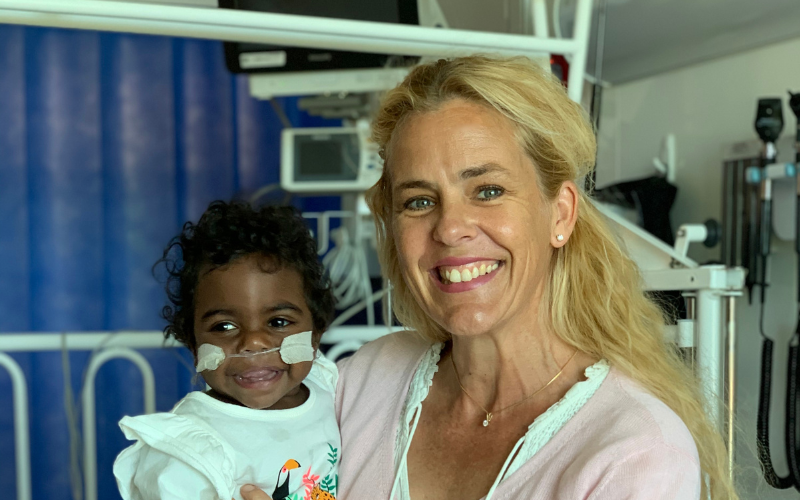
A co-designed and culturally secure intervention to improve medical follow-up for Aboriginal children hospitalised with acute chest infections resulted in higher follow-up rates and improved longer-term lung health outcomes for children.
Aboriginal children hospitalised with acute chest infections are at-risk of developing bronchiectasis, which is a chronic, debilitating and life-shortening lung disease.
The earliest sign of chronic lung disease after hospitalisation is usually a wet cough for more than four weeks. If the ongoing wet cough is managed early, bronchiectasis can often be prevented. Therefore, effective follow-up after being discharged from hospital is essential.
As published in The Lancet Regional Health - Western Pacific on 10 February 2023, a study co-led by respiratory clinician researchers Dr Pam Laird and Associate Professor André Schultz evaluated the implementation of a hospital-based culturally secure intervention to facilitate medical follow-up for Aboriginal children hospitalised with chest infections four weeks after discharge from Perth Children’s Hospital (PCH) in Western Australia.
The intervention included hospital system changes, hospital staff training and culturally secure health information with resources being provided for families.
Health outcomes before and after the intervention were measured, with 181 children completing the study. The follow-up rates one month after hospital discharge were significantly higher in those children after the intervention was implemented (50.7%) compared to the children who did not receive the intervention (13.6%).
The improved follow-up appeared to contribute to healthier kids as the lung health-related quality of life of children with a chronic wet cough was also improved in children after the intervention was implemented, aligning with an increase in the percentage of children who received antibiotic treatment one month after hospital discharge (57.9%). This compared to only 13.3% of children receiving antibiotics in the pre-intervention group.
Dr Laird, who is a researcher with the Wal-yan Respiratory Research Centre - a powerhouse partnership between The Kids Research Institute Australia, PCH and Perth Children’s Hospital Foundation – and a physiotherapist with PCH, said the study demonstrates the urgent need for a national follow-up strategy for Aboriginal children who have been hospitalised for acute chest infections, to prevent more serious lung disease.
“Almost one in five young Aboriginal children hospitalised for an acute chest infection is diagnosed with bronchiectasis within two years of being discharged,” Dr Laird said.
“While national guidelines recommend Aboriginal children receive medical follow-up a month following hospital discharge to ensure any ongoing cough can be treated, this is not widely known and there are not processes in place to facilitate this.
This study has demonstrated an effective intervention for improving medical follow up for Aboriginal children hospitalised with acute chest infections, and most importantly, for improving the longer-term lung health of Aboriginal children.
“Our aim now is to collaborate to scale-up this study as a national clinical trial. We would like to facilitate implementation of a culturally secure follow-up strategy in other regions of Australia, to ensure that Aboriginal children around the nation are receiving effective medical follow-up and treatment. And if we can demonstrate wider success in respiratory health then perhaps this strategy can be adapted to address other key health issues for Aboriginal children.”
The paper – Evaluation of the implementation and clinical effects of an intervention to improve medical follow-up and health outcomes for Aboriginal children hospitalised with chest infections – was published in the journal The Lancet Regional Health - Western Pacific and can be read here.
This research was supported by a Perth Children’s Hospital Foundation (PCHF) New Investigator Grant, the Medical Research Future Fund and by Mineral Resources Limited, proudly supporting the Wal-yan Respiratory Research Centre via PCHF as Principal Partner of the BREATH (Building Respiratory Equity for Aboriginal and Torres Strait Islander Health) Team. The team is led by paediatric lung health researcher, and Mineral Resources Fellow, Associate Professor André Schultz.
